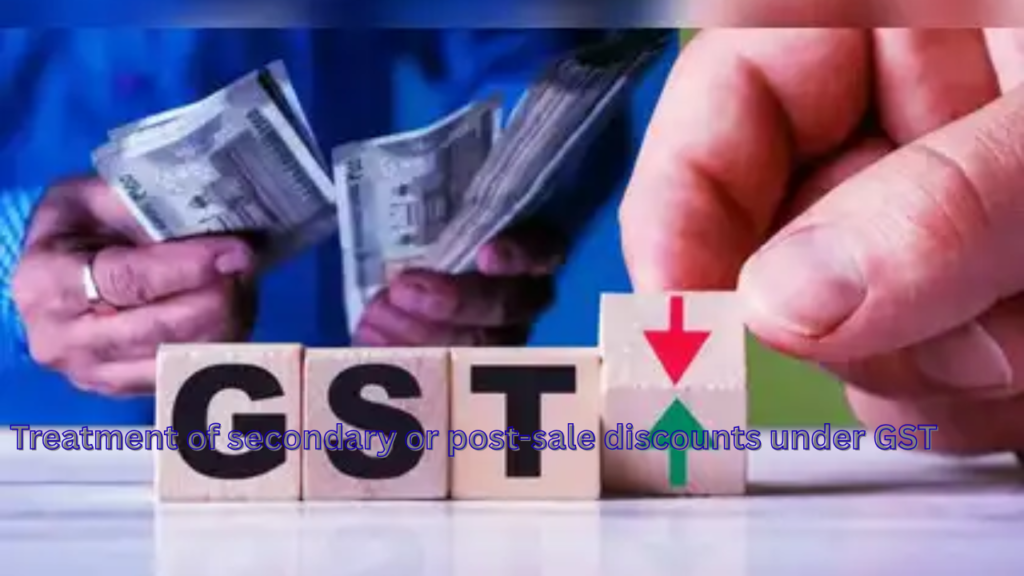
1. Input Tax Credit (ITC) on discounted payments via financial/ commercial credit notes
- What the law says:
- Section 16(1) of CGST Act allows ITC on tax charged in invoices, if used for business.
- Circular No. 92/11/2019 clarifies that if the supplier issues a financial/ commercial credit note (without GST adjustment), the supplier cannot reduce tax liability, because the transaction value for GST doesn’t change.
- Impact on the recipient:
- The buyer (recipient) pays less to the supplier due to discount.
- But since GST charged earlier is not reduced, ITC is available in full.
- The buyer does not need to reverse ITC.
👉 In simple terms: You still get full ITC even if you paid less to your supplier because of a post-sale discount, as long as GST amount on the invoice hasn’t been reduced.
2. Whether post-sale discounts are “consideration” for dealer’s supply to end customer
- Key concept:
- “Consideration” under GST includes money or any inducement for supply.
- If there’s no agreement between the manufacturer and the end customer, then:
- Manufacturer sells to dealer.
- Dealer sells to customer.
- Both are independent sales on principal-to-principal basis.
- Discount is just to make pricing competitive.
- It is not inducement to dealer for pushing sales → not treated as consideration.
- But if there is an agreement (manufacturer fixes end customer price, dealer passes discount to customer):
- Manufacturer is indirectly supporting the dealer to sell at reduced price.
- That discount becomes part of the overall supply chain consideration.
👉 In simple terms:
- If discounts are just commercial decisions, not tied to an agreement with the end customer → not consideration.
- If discounts are linked to a contract that ensures customers get a reduced price → they may be treated as consideration.
3. Post-sale discounts as consideration for promotional activities
- General case:
- Dealers may do promotions to sell goods.
- But those goods belong to them (they already bought them from manufacturer).
- So, promoting their own stock is for their benefit → discount is not for a service rendered to manufacturer.
- Hence, such discounts are not consideration for a separate supply.
- Special case (when agreement exists):
- If manufacturer specifically asks dealer to run campaigns, co-brand, arrange exhibitions, etc.
- And payment/discount is clearly linked to those services →
- Then dealer is actually providing a service to manufacturer.
- GST will apply on that service, separate from goods.
👉 In simple terms:
- Normal discounts are just price reductions → no GST as service.
- If discounts are tied to promotional services spelled out in agreement → then treated as separate service with GST liability.
📊 Summary Table – Post-Sale Discounts under GST
| Situation | GST Treatment | ITC Impact (Recipient/Dealer) |
|---|---|---|
| Supplier issues financial/ commercial credit note (without GST adjustment) | Supplier cannot reduce GST liability. Transaction value for GST stays same. | Full ITC available to recipient. No reversal required. |
| Post-sale discount given by manufacturer to dealer (no agreement with end customer) | Independent sales: Manufacturer → Dealer, Dealer → Customer. Discount is just a price reduction, not consideration. | Dealer keeps full ITC. No change in treatment. |
| Post-sale discount linked to agreement with end customer (manufacturer ensures final discounted price to customer) | Discount acts as inducement for dealer to sell at reduced price → becomes part of overall consideration. | Still no ITC reversal, but discount has to be factored in as part of supply chain value. |
| Dealer promotes own goods (normal sales push, competitive pricing, generic discounts) | Activities are for dealer’s own benefit. Discount is not consideration for service. | No impact on ITC. Dealer continues to enjoy ITC as usual. |
| Dealer carries out specific promotional/ marketing activities under manufacturer’s instructions (advertising, co-branding, exhibitions, customer support, etc.) | Treated as a separate supply of service by dealer to manufacturer. GST is payable on value of such services. | Dealer must charge GST to manufacturer for services; ITC available subject to usual conditions. |
Final Summary
- ITC – Always fully available to the recipient if supplier issues financial/ commercial credit notes (no GST reversal needed).
- Discounts to dealers – Normally not “consideration”, unless linked to an end-customer agreement.
- Promotional activities – Normal dealer promotions = not a service to manufacturer.
- Specific contractual promotions = service → GST payable.